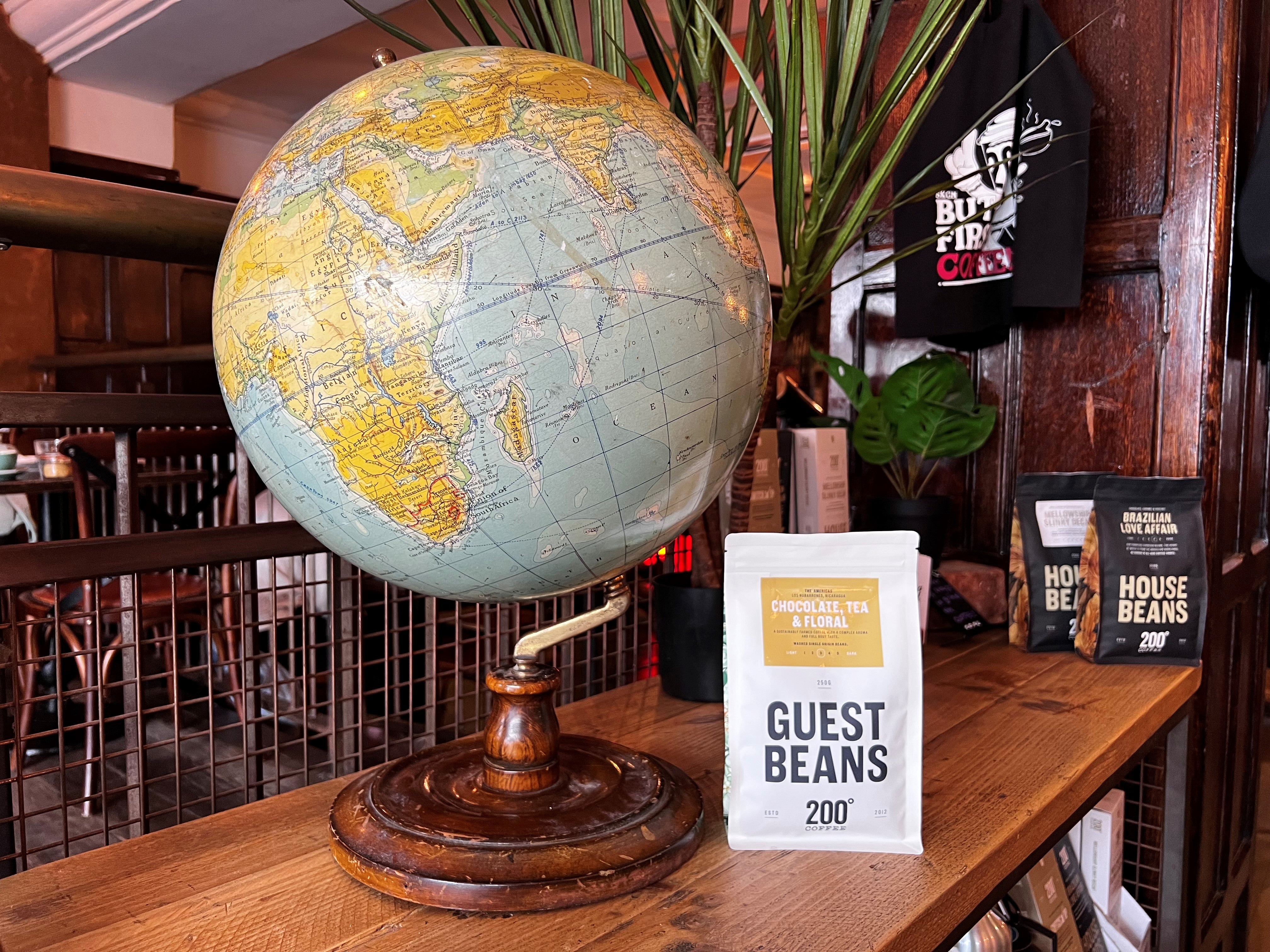Sustainability starts at the source

- Community & Sustainability
Our Communications Manager Sinéad is on a mission to understand the complicated word “sustainability” and what is means for us as a coffee company.
When I joined 200 Degrees in April 2023, it was fair to say I was a coffee novice. I liked coffee, but did I know much about growing/importing/roasting it? No, I did not. Roast profiles and varietals were beyond me. Just make me a flat white and I’ll be happy.
But where my technical knowledge was weak, my millennial guilt about sourcing and sustainability (for both the environment and for those whose livelihoods depend on coffee production) is strong. I don’t ever want to unknowingly consume anything that makes people’s lives worse – that would leave a bitter taste in my mouth.
So, after a few months learning the basics (though please don’t ask me to steam milk, it scares me – so hot, so frothy!) I started actively seeking to know more about how we source our coffee, and what that means for farmers, and our customers.
One thing I did know before I started, is that getting beans from the hills of Nicaragua to our Roast House on the banks for the river Trent is never going to be a completely green operation, unless someone pulls their finger out and sorts out teleporting. And bar an extreme change in climate (and in current circumstances, it’s maybe not that far-fetched), we aren’t going to be growing any coffee on Nottingham’s undulating hillsides anytime soon. So what does it mean to be sustainable with our sourcing, if we can’t avoid the necessary carbon emissions that come with exporting?
For us, being sustainable is about finding great quality coffee that is grown in an environment where the place and the people who work there are looked after. So, my first question to our Head Roaster Mike? If our coffee is sustainably sourced, why doesn’t our packaging have a Fairtrade or Rainforest Alliance logo? And while the considered, nuanced answer I got back is certainly too long for this blog, the gist of it is this: the criteria to be RFA or Fairtrade certified is only attainable by larger farms, and rules most small independent co-ops out of consideration.
Take our latest Guest Bean, Ethiopia Buliye: this coffee has been produced by 11 farmers who each have just 5 hectares of land on which they grow coffee. These famers are unable to support the infrastructure required to export coffee by themselves, so many come together as a co-op and sell through the local mill. To have each of them RFA certified would be a huge expense. Compare this operation to the Fazenda Pantano farm in Brazil which provides the main component of our much-loved Brazilian Love Affair blend. This farm is 795 hectares, produces more than 200 varietals and their coffee output means they can afford to be RFA certified.

Similarly, Fairtrade requires a vast number of resources from the famers in order to guarantee certification. That’s not to say Fairtrade and Rainforest Alliance certification isn’t worth having. It’s just that they don’t speak for all sustainable operations. The smaller coffee providers who we source our coffee from are the ones who are small, local, family or community run and often farmed by hand. The farmers use traditional techniques that don’t negatively impact the land, and their carbon footprint is minimal.
So how does 200 Degrees ensure the sustainability of operations thousands of miles away? Like a good old-fashioned romantic comedy, it’s about finding your perfect partner – someone who communicates well, who you can trust and can rely on to do the right thing.
Volcafe are our main importers for the coffee that goes into making our signature blend, Brazilian Love Affair. And we trust them because they are open and transparent, providing us with clear information about the farmers, their pay, their operations, and the work Volcafe does to support them. Our co-founders Rob and Tom have been to visit the farm Fazenda Pantano in Brazil, seeing for themselves the way coffee is produced. Fazenda Pantano also funds various training schemes and courses for employees, as well as supporting a nearby school and providing full healthcare. Similarly, our Switch-Up charity coffee, also imported by Volcafe, is produced exclusively by women farmers in Guatemala. By providing women artisans with skills and income opportunities, our importer Volcafe is able to help transform cycles of poverty to cycles of prosperity.
We also import via other companies like Falcon and Indochina, which have good reputations for supporting small farmers, and have the receipts to prove it. Going back to our latest Guest Bean from Ethiopia, those 11 small farms that produced this coffee receive a premium for every kilo delivered after the harvest and receive an interest-free credit line for expenses during the off season, to ensure quality, consistency and a supported way of life for coffee farmers, all year round.
It’s clear there’s more to sustainability than sticking a logo on a bag, and thanks to the commitment of the coffee geeks here at 200, I can rest safe in the knowledge that my growing coffee habit is not going to cost the earth.
